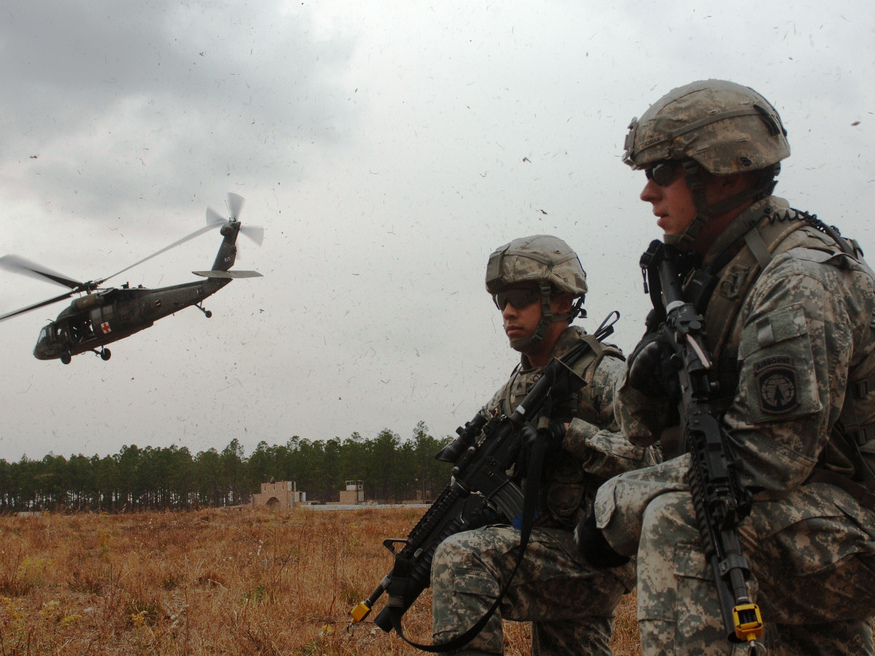
About half of all Americans oppose military intervention in Syria, but opposition to attacks is much higher among current service members, according to recent opinion polling by the Military Times — which found that 75 percent of the military now oppose a U.S. military strike in Syria.
The survey conducted online Monday and Tuesday found that by a ratio of 3-1, an overwhelming majority of the 817 respondents oppose U.S. airstrikes, even after reports from the Obama administration and the Arab League claiming that the Syrian regime used chemical weapons to kill hundreds of rebel fighters and civilians last month.
Some independent reports have called into question the claims made by the Obama administration on who was responsible for the reported chemical attack. Mint Press News reported that some local residents and rebels in Ghouta, a suburb of Damascus where an Aug. 21 chemical attack reportedly took place, allege that the chemical weapons were controlled by rebel groups. More recently, the Christian Science Monitor reported that Iranian officials had warned the U.S. that some rebel groups have had chemical weapons since July 2012, urging Washington to issue “an immediate and serious warning” against their use. There have been several previous allegations of chemical weapons attacks in Syria from both the regime and the opposition, dating back to last year.
An even larger percentage — 80 percent of those polled — said they do not believe getting involved in the civil war, which is already well into its third year, is in the U.S. national interest. After more than a decade of fighting wars in Afghanistan and Iraq, many respondents said that they are simply fed up with constant wars that are increasingly maligned by the U.S. public and the international community.
“People are just sick of it,” said Lt. Cmdr. Jeffrey Harvey, a nuclear-trained officer who works at Newport News Shipbuilding in Virginia. “It’s like the old pre-World War II isolationism, I hear grumblings of that. People would rather withdraw all our troops and let the rest of the world figure out what to do. I think there is a lot of credence to that argument.”
Some respondents also expressed opposition to aiding the opposition, which contains numerous factions, including the al-Qaida-aligned Al-Nusra Front and the Islamic State of Iraq and the Levant, both of which are listed as terrorist groups by Washington.
Many military experts worry that emboldening these opposition factions could further destabilize the region. “In my eyes, the rebels in Syria are the same as the insurgents in Iraq,” said Army Staff Sgt. Derek Harris
Estimates by the U.N. and independent NGOs indicate that 110,000 have died and 1.8 million Syrians have been made refugees as a result of the war. President Obama has not abandoned the idea of missile strikes, but said he will hear out plans put forth by Russia for Syria to hand over its chemical weapon supply for destruction.
The Associated Press reported Monday that Syrian Foreign Minister Walid al-Moallem accepted the Russian proposal calling for Syria to place its chemical weapons under international control. Under the proposal, Syria’s chemical weapons stockpiles would eventually be destroyed.
Regardless of the outcome in Syria, many Americans, both civilian and military, are tired of ongoing wars abroad that have killed thousands. Recent U.S. wars in Iraq and Afghanistan have produced a growing number of former service members who think those wars were not worth fighting. A 2011 Pew opinion poll among U.S. veterans who served in the years following the 9/11 terrorist attacks found that 1 in 3 thinks the U.S. wars in Iraq and Afghanistan were not worth fighting.
As of February, there were 6,656 U.S. troops who had been killed fighting wars in Iraq and Afghanistan, according to statistics published by the Brown University Costs of War project.
U.S. involvement in Iraq, Afghanistan and Pakistan has cost U.S. taxpayers an estimated $3.1 trillion and led to the deaths of between 158,000 and 202,000 civilians, according to the same study.


